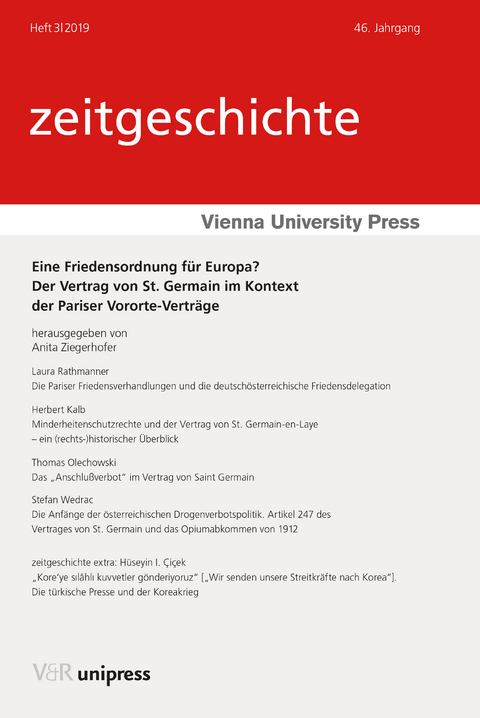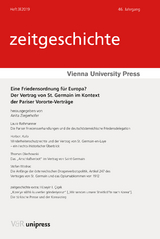Eine Friedensordnung für Europa?
Der Vertrag von St. Germain im Kontext der Pariser Vororte-Verträge
Seiten
Am 18. Jänner 1919 schien die gesamte Welt auf Paris zu blicken, als der französische Ministerpräsident Raymond Poincaré die Friedenskonferenz eröffnete. Man wollte einen dauerhaften Frieden für die gesamte Welt schließen und war dementsprechend motiviert. Doch bald sollte diese anfängliche Euphorie der harten politischen Realität weichen: Spätestens mit der Unterzeichnung des Vertrages von Versailles am 28. Juni 1919 war auch der österreichischen Delegation unter Karl Renner bewusst, dass es wenig Verhandlungsspielraum gab und man sich mit einem „Friedensdiktat“ werde abfinden müssen. Im ersten Beitrag werden die Pariser Friedensverhandlungen und die Rolle der österreichischen Delegation thematisiert. Die beiden folgenden Beiträge beleuchten wesentliche und weitreichende Inhalte des Vertrages von St. Germain: die Minderheitenfrage und das „Anschlußverbot“. Der letzte Artikel weist auf die globale Dimension des Vertrages hin: Österreich musste das Opiumabkommen von 1912 unterzeichnen.
Poincaré opened the Peace Conference. They wanted to have a sustainable peace for the whole world and thus people were very motivated. Yet, shortly after this event the emerging euphory made way for the harsh political reality: After the treaty of Versailles was signed on June 28th 1919 Karl Renner, leader of the Austrian delegation, was well aware that negotiations were hardly possible and one had to cope with the “peace dictate”. The first contribution explores the peace negotiations of Paris and the role of the Austrian delegation. The two following contributions discuss crucial and wide-ranging points of the Treaty of Saint-Germain: The treatment of minorities and the “Anschlußverbot” (the prohibition on the merging of German-Austria and Germany). The last article addresses the global dimension of the treaty: Austria had to sign the International Opium Convention of 1912.
Poincaré opened the Peace Conference. They wanted to have a sustainable peace for the whole world and thus people were very motivated. Yet, shortly after this event the emerging euphory made way for the harsh political reality: After the treaty of Versailles was signed on June 28th 1919 Karl Renner, leader of the Austrian delegation, was well aware that negotiations were hardly possible and one had to cope with the “peace dictate”. The first contribution explores the peace negotiations of Paris and the role of the Austrian delegation. The two following contributions discuss crucial and wide-ranging points of the Treaty of Saint-Germain: The treatment of minorities and the “Anschlußverbot” (the prohibition on the merging of German-Austria and Germany). The last article addresses the global dimension of the treaty: Austria had to sign the International Opium Convention of 1912.
Prof. Dr. Thomas Olechowski lehrt an der Rechtswissenschaftlichen Fakultät der Universität Wien.
Stefan Wedrac ist Historiker in Wien und derzeit an der Forschungsstelle für Rechtsquellenerschließung des Institutes für Rechts- und Verfassungsgeschichte der Universität Wien tätig.
Dr. Anita Ziegerhofer ist außerordentliche Professorin für österreichische Rechtsgeschichte am Institut für Rechtswissenschaftliche Grundlagen der Universität Graz.
Prof. Dr. Oliver Rathkolb lehrt am Institut für Zeitgeschichte der Universität Wien und ist Vorsitzender des Internationalen Wissenschaftlichen Beirats des Hauses der Geschichte Österreich (HGÖ).
| Erscheinungsdatum | 10.12.2019 |
|---|---|
| Co-Autor | Laura Rathmanner, Herbert Kalb, Thomas Olechowski, Stefan Wedrac, Hüseyin I. Cicek, Anita Ziegerhofer |
| Mitarbeit |
Herausgeber (Serie): Oliver Rathkolb |
| Zusatzinfo | mit 4 Abbildungen |
| Verlagsort | Göttingen |
| Sprache | deutsch |
| Maße | 155 x 232 mm |
| Gewicht | 229 g |
| Themenwelt | Geschichte ► Allgemeine Geschichte ► Zeitgeschichte |
| Sozialwissenschaften ► Politik / Verwaltung ► Europäische / Internationale Politik | |
| Schlagworte | Anschluss • Bauer, Otto • Delegation • Drogenpolitik • Friedenskonferenz • Großdeutsche Lösung • Kalter Krieg • Koreakrieg • Minderheitenschutz • Opium • Österreich • Paris • Presse • Türkei • Vertrag von St. Germain • Völkerbund • Wilson, Woodrow • Zollverein |
| ISBN-10 | 3-8471-1008-X / 384711008X |
| ISBN-13 | 978-3-8471-1008-8 / 9783847110088 |
| Zustand | Neuware |
| Haben Sie eine Frage zum Produkt? |
Mehr entdecken
aus dem Bereich
aus dem Bereich
Gewalt, Umwelt, Identität, Methode
Buch | Softcover (2024)
Spector Books OHG (Verlag)
36,00 €
wie Freud im Kollektiv verschwand
Buch | Hardcover (2024)
Klett-Cotta (Verlag)
25,00 €




